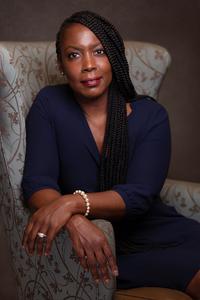 |
|
| (photo: Sarah Willis) | |
Terah Shelton Harris is a librarian and freelance writer whose work has appeared in consumer and trade magazines including Catapult, Women's Health, and Every Day with Rachael Ray. One Summer in Savannah (Sourcebooks Landmark, July 4, 2023)--about the aftermath of a rape-related pregnancy--is her first published novel.
Who is the ideal reader for this novel?
Anyone with an open heart and mind is an ideal reader. I invite anyone looking to read something different, explore new topics and ideals, and discover how a shared trauma connects two people to read this book.
Why write this story now?
Every year, thousands of brave women are faced with rape-related pregnancies, a number that stands to increase with the overturning of Roe v. Wade. And yet, conception following a sexual assault is rarely covered in fiction.
Why do you suppose that is?
There is a tendency to run away from that which makes us uncomfortable. As writers, we should take risks, challenge ourselves, and step outside of our lived experiences. We should also challenge our readers to do the same, to venture far from their comfort zones so that they may grow. By writing One Summer in Savannah, it is my hope, at the very least, to raise awareness of the plights of the Saras of the world.
What other novels, besides yours, tackle this topic?
In researching comps, I discovered just one, The Atonement Child by Francine Rivers. The aftereffects of a sexual assault on a family are also beautifully explored in We Were the Mulvaneys by Joyce Carol Oates.
You don't ever render the scene detailing Sara's assault.
I did not want to include Sara's assault on the page. While it is briefly discussed in dialogue and introspection, it is not detailed at all. Instead, I focused on Sara's love and protection for her daughter, Alana. Every decision Sara makes is in the best interest of Alana. Despite her trauma, Sara placed Alana's needs ahead of her own, and that's a testament to the real Sara and all the Saras of the world. That's the truest form of bravery.
In your acknowledgements, you thank "the person who shall remain anonymous, who lived Sara's story and provided... insight and knowledge" for the novel. What do you hope that real-life person will feel after reading the novel?
Simply put, I want that person to feel seen.
Why did you set the novel in Savannah, Georgia?
I find setting just as important as plot. It can almost act as a character in story. I've visited Savannah several times over the years and somehow saw an advertisement for a cottage on Hird Island. After a little research, I learned that Hird Island is only accessible by boat or aircraft. I knew immediately that's where Jacob (the identical twin brother of the rapist) was going to live. It illustrates that he's back home but still craves his privacy.
Why tell the story via two narrative points of view?
This story was always Sara's to tell. But when I started writing, I felt as if something was missing, another side of her story. That's when I realized that Jacob's point of view offered direct commentary and perspective that would not have existed in Sara's single point of view.
Why create the two brothers in the story as identical twins?
Making Daniel (the rapist) and Jacob (his brother) identical twins allowed me to stretch and explore an unexpected and unique nuance. It would have been easy for me, for Sara, for the reader, to accept Jacob if he were a fraternal twin. But writing and reading isn't supposed to be comfortable or easy.
A mirror of life?
Yes, the road to forgiveness is often not paved smoothly. It's rough. It's hard and lined with unexpected obstacles. I wanted Sara's journey to reflect that. She's been running from her past for eight years and when she finally accepts her plight and begins her walk toward forgiveness, I, quite literally, wanted Sara to face her past. While the two brothers are identical twins, certain circumstances (no spoilers) have altered their appearance, but making them fraternal twins would have been taking the easy way out when forgiveness is anything but easy.
Would you say forgiveness is the overarching theme of the book?
Forgiveness is more about healing the person who gives it than absolving someone of their wrongs. Understanding forgiveness is about defining it for yourself and not conforming to someone else's definition. It takes a strong heart and a willing mind to accept that. And while forgiveness is the overarching theme of the book, grief is also an undercurrent. Forgiveness and grief often collide, and I wanted to explore that in two separate ways.
How so?
Initially, Sara chooses to run from her grief. When the book opens, Sara and Alana live in Lubec, Maine, which is the easternmost town in the continental United States. That setting illustrates just how far Sara is willing to hide from the world. But in returning home to care for her father, she stops running and faces up to her grief. Jacob, too, comes home to face his grief, but soon realizes that he doesn't know how to grieve. And what Jacob experiences is what many experience when standing at the intersection of grief and acceptance.
That intersection is complicated and difficult. Yet the journeys these characters take, emotionally and spiritually, are also bittersweet.
I like to say that I write books with bittersweet endings and my next novel, Long After We Are Gone (spring 2024), continues that theme. It's a family saga that tells the story of four siblings--each fighting a personal battle--who return home in the wake of their father's death to save their family home--and themselves. --Kathleen Gerard

